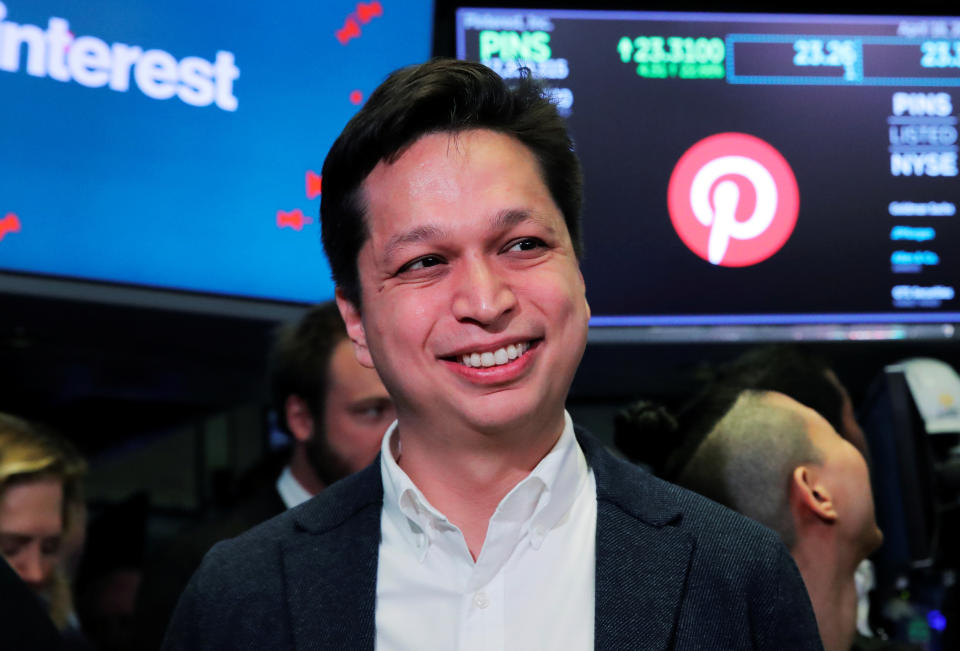How Pinterest avoided the unicorn IPO losing streak
Pinterest (PINS) went public on April 18, smack in the midst of the unicorn IPO parade of the past six months that included Lyft (March), Slack (April), Uber (May), CrowdStrike (June), Smile Direct Club (September), and Peloton (September).
Every one of those stocks is trading down from its IPO price. Except for Pinterest.
Pinterest is up 35% since its IPO, and has managed to keep itself out of the unicorn funeral conversation.
The social media site, on which users share images and videos by pinning them to their page, is not yet profitable, just like most of the other recent unicorn IPO names. But Pinterest arguably hit the public market with less hype (certainly less of its own self-hyping), and many investors and analysts like the social media company’s steady growth and its future outlook as a broad “visual discovery engine,” as the company described itself in its S-1 filing.
Pinterest also delivered blowout Q2 earnings in August, in its first earnings report since going public. Revenue jumped 62% in Q2 to $261.2 million, handily beating expectations of $235.5 million. And revenue growth is accelerating; Q1 revenue grew 54%. It also lost less than expected: 6 cents per share compared to expectations of 8 cents. Pinterest raised its 2019 revenue outlook to a range of $1.09 billion to $1.12 billion.
As for user count, Pinterest reported 300 million monthly active users in Q2 — smaller than Twitter’s user base (320 million monthly active users) but still a 30% increase from the same quarter last year. Pinterest’s average revenue per user, a key metric, rose 29% in Q2 to 88 cents.
The stock surged nearly 20% on the earnings report.
Deutsche Bank, following that earnings report, swiftly upgraded Pinterest stock to buy from hold. DB analyst Lloyd Walmsley highlighted the company’s user growth, ad sales growth, expansion to new markets, and the fact that users are posting more videos, which advertisers like. Pinterest is “executing across more vectors of growth than just about any company in our coverage,” he wrote in a research note.
Not a typical Silicon Valley founder
And then there’s Pinterest co-founder and CEO Ben Silbermann.

Silbermann is not a typical Silicon Valley founder, and his modesty — he stays behind the curtain and does very little press — has benefited Pinterest by keeping hype under control.
He grew up in Des Moines, Iowa, then went to Yale with plans of being a doctor (both of his parents are doctors). Instead, he decided against medicine and, after a stint as a consultant in Washington, D.C., moved to San Francisco to work at Google in customer support. (He tells everyone that routinely reading TechCrunch gave him the tech itch.)
His childhood bug collection inspired Pinterest, which was envisioned as a place for hobbyists.
These days, Pinterest still has a reputation as being mostly for women, but its power users say that will soon change. “I think a lot of guys, five years from now, will see the power of Pinterest,” says Lori Bergamotto, style director at Good Housekeeping. “It’s positive, it’s a way to be inspired, it’s aspirational. And honestly, the best part of it is it’s easy. A lot of these sites make things difficult, and Pinterest curates things for you. For men, you’ll start saying, ‘Oh, I’m going to buy this house, or buy this car’ and you will start pinning things.”
The believers see Pinterest as standing apart from the other social media sharing sites. As The Guardian writes, “There is nothing cynical about Pinterest.” It has also largely steered clear of the “fake news” problems Facebook and Twitter have had to navigate. (Pinterest did edge into politics a bit in August when it made an effort to fight misinformation on its site about vaccines.)
David Trainer of research firm New Constructs likes the company’s financials, especially in contrast to its peers.
“The difference with Pinterest is they actually have a viable business model,” Trainer says. “They do make money domestically, and they have a very strong path to profitability internationally. So there’s actually a real business model, whereas with Lyft and Uber, we don’t believe those business models really ever have a chance of making a significant amount of money, certainly nowhere near what their stock price valuations suggest.”
—
Daniel Roberts is a senior writer and show host at Yahoo Finance. Follow him on Twitter at @readDanwrite.
What really caused the unicorn IPO funeral
Uber, Lyft stock performance shows 'appetite for risk has diminished'
Netflix stock is vulnerable in a recession, Nomura says
Meet the ‘phoenix’ stocks: Zoom, MongoDB, PagerDuty and more
How Eventbrite’s horrible stock performance is hurting Square
